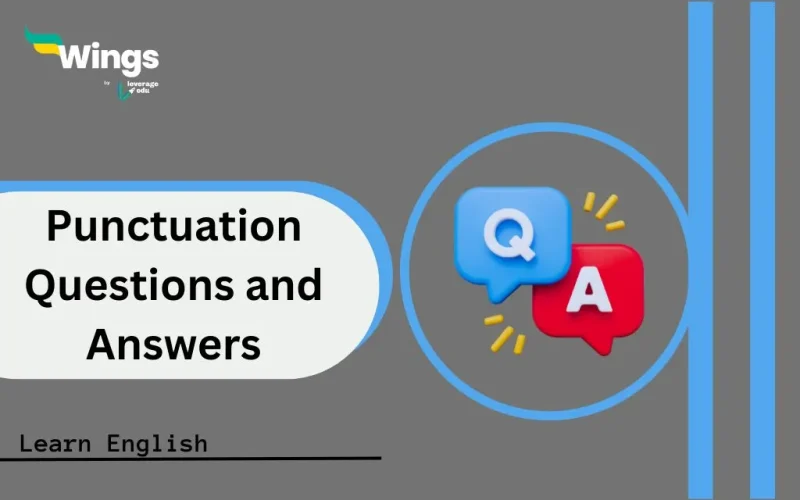Punctuation Questions and Answers: Ever stared at a blank page wondering if a comma or semicolon is the right choice? You’re not alone! Punctuation can be tricky, but fear not, fellow wordsmiths! This blog is your one-stop shop for all things punctuation-related. We will break down the definitions of common punctuation marks, offer fill-in-the-blank exercises to test your skills, and even challenge you with some multiple-choice quizzes. This blog is here to help you master the art of making your writing clear and concise.
This Blog Includes:
Also read: Punctuation: A Quick Guide: Types | Sample Exercise
Punctuation Questions and Answers
In this section of the blog on punctuation questions and answers, you will discover exercises on MCQs, fill-in-the-blanks, and true or false.
MCQs
Instruction: Below are Multiple Choice Questions & Answers (MCQs) focusing on “Types of Punctuation”.
1. Which of these does not come under the punctuation mark?
a) Full stop
b) Comma
c) Colon
d) Hashtag
2. The full stop is utilised at the last of an indirect question.
a) False
b) True
3. The comma is used after a word when it is used to address a person.
a) False
b) True
4. Which among these is utilised after a nominative absolute?
a) Comma
b) Colon
c) Question mark
d) Full stop
5. Which of these is used to divide short co-ordinate clauses of a compound sentence?
a) Comma
b) Semicolon
c) Colon
d) Full stop
6. Which among these is used to separate a series of loosely related clauses?
a) Full stop
b) Comma
c) Colon
d) Semicolon
7. Which of these is used between grammatically independent sentences?
a) Colon
b) Semicolon
c) Comma
d) Hyphen
8. Which among these is utilised to convey proportions?
a) Colon
b) Semicolon
c) Hyphen
d) Comma
9. Pick the right statement:
a) Her aunt who lives in Mumbai is a doctor.
b) Her aunt, who lives in Mumbai, is a doctor.
c) Her aunt, who lives in Mumbai is a doctor.
d) Her aunt who lives in Mumbai, is a doctor.
10. Choose the right statement:
a) He met a beautiful, European woman.
b) He met a beautiful, European woman.
c) He met a beautiful, European, woman.
d) He met a beautiful, European, woman.
Answer’s
1. D.
2. A.
3. A.
4. B.
5. B.
6. C.
7. A.
8. B.
9. B.
10. B.
Fill in the Blanks
Instruction: Fill in the blanks with correct punctuation marks.
- They use a(n) ___________ to introduce a pause within a sentence.
- Lina ____________ s jude the Obscure was banned when it was published.
- Rohit completed all his official work and pending assignment __________ Amit did not finish his part
- He was wearing a saggy, faded, yellow T ___________ shirt.
- “Yes, he did hear something but, sorry boys __________”
Answer’s
- Comma
- Apostrophe
- Semicolon
- –
- .
True or False
Instructions: Write “True” or “False” for each statement.
- A comma is always utilised to divide two independent clauses.
- A colon can be used to introduce a list.
- A question mark should be used at the end of a declarative sentence.
- An apostrophe can show possession.
- A period indicates a strong pause at the end of a sentence.
Answers
- False
- True
- False (Use a period.)
- True
- True
Punctuation Questions and Answers PDF
You can download the above-mentioned punctuation questions and answers from the table below:
| Punctuation Q&As for School Students | Click Here |
Related Reads:
FAQ’s
Q1. What do you understand by punctuation marks in grammar?
Ans: Punctuation is a tool that allows us to organise our ideas and make it more comfortable to review and share our ideas. Common English punctuation marks are commas, periods, quotations, apostrophes, exclamations, brackets, parentheses, braces, dashes, hyphens, ellipses, colons, questions, and semicolons.
Q2. What do you understand by full-stop punctuation?
Ans: The full stop (.), also known as the period, presents few problems. It is chiefly used to mark the end of a sentence describing a statement.
Q3. What do you think punctuation is a part of grammar?
Ans: While punctuation is not grammar, it is in the type of the mechanics of used while writing, which comes under the umbrella of grammar. Grammar delivers structure and standardisation to language rules, and punctuation assists in this process through symbols and marks that symbolise meaning to readers and writers.
This was all about the punctuation questions and answers for English grammar students. Hope you understand the concept and know how to proceed. You can also follow the page of Leverage Edu for more exciting and informative blogs.


 One app for all your study abroad needs
One app for all your study abroad needs












 60,000+ students trusted us with their dreams. Take the first step today!
60,000+ students trusted us with their dreams. Take the first step today!
4 comments
MCQs:
1.D
2.A
3.B
4.B
5.B
6.A
7.A
8.B
9.B
10.C
Fill in the Blank:
1.Comma
2.Apostrophe
3.Comma
4.Underscore
5.point
True or False:
1.true
2.true
3.false
4.true
5.true
FAQs:
question 1: Punctuation marks are symbols used to clarify meaning,indicate pauses,and structural sentences such as (period,commas,and ?).
question 2: full stop is a punctuation used to indicate the end of sentence.
question 3:Yes, punctuation is a part of grammar because it helps structure sentence,and clarify meaning.
Good job on answering all questions correctly. To practice more exercises on punctuation check out the following blogs:
https://leverageedu.com/explore/learn-english/punctuation-for-class-7/
https://leverageedu.com/explore/learn-english/punctuation-for-class-8-learn-the-basics-of-english-grammar/
https://leverageedu.com/explore/learn-english/punctuation-for-class-9/
https://leverageedu.com/explore/learn-english/punctuate-the-following-sentence/
Very amazing way 21/30
Thank you for your appreciation. For more about punctuation in English Grammar here: https://leverageedu.com/explore/category/punctuation/